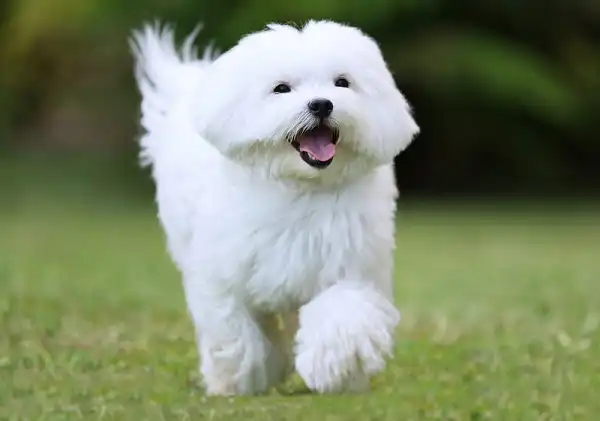Whether you’re considering adding a Maltese to your family or you already have one, there are some things you should know about this charming breed. Thanks to their affectionate nature and cheerful disposition, Maltese make great companion animals. But they also require special care, including regular grooming and plenty of exercises. Keep reading to learn more about what it’s like to live with a Maltese.

Maltese Description
Maltese is a small, toy breed. Their coat is long and silky, usually white with occasional lighter shades of tan or cream. The Maltese are active dogs, so it’s important for them to have plenty of exercise and activity throughout the day. They do well in a variety of activities such as walking, running, playing fetch, or swimming. These dogs are also known for their affectionate and loyal nature. They get along well with other animals, children, and strangers making them great family pets. The Maltese are intelligent and easily trainable; they respond well to positive reinforcement techniques such as treats and praise. With proper training, they can learn basic commands such as come, sit, stay, down, etc… As long as you provide lots of love and patience your Maltese will thrive in your home!
Maltese Habitat
Maltese is a great choice for indoor living, as they typically don’t require a lot of space to thrive. They do best in a home with lots of love and attention, and they do not need large yards or acreage to get enough exercise. In fact, these dogs enjoy feeling close to their owners and can even become “Velcro” dogs if given the opportunity. The ideal environment for Maltese is one that is warm and comfortable all year round. These dogs commonly have sensitive skin and may not tolerate temperature extremes very well. The house should have plenty of soft blankets, beds, and chairs where your Maltese can rest comfortably away from drafts or air conditioning units that could otherwise cause them discomfort. Maltese also appreciate human interaction and playtime, so it’s important to give them several opportunities throughout the day for interaction and exercise. They are a smart breed and enjoy learning new tricks, so teaching them activities such as agility courses or retrieving toys can be both fun and rewarding experiences for both you and your furry friend!
Maltese Diet
Maltese are small dogs, so their diet should be formulated to provide them with all the necessary nutrients for their size and activity level. The best kind of food for Maltese is one that is specially designed for toy breeds, as these formulas are usually higher in protein and fat than those made for larger dogs. High-quality dog food is an essential part of keeping your Maltese healthy and happy! A good diet for Maltese should provide them with the right balance of proteins, carbohydrates, fats, vitamins, and minerals. Protein provides energy and helps keep muscles strong while carbohydrates provide sustained energy over time. Fats are important as they help to maintain coat health and skin condition while providing essential fatty acids. Vitamins and minerals should also be included in any good diet plan to ensure the proper growth and development of your Maltese pup. When it comes to treats, moderation is key! While it’s okay to give your Maltese special snacks every now and then, make sure they don’t take up more than 10 percent of your pup’s daily caloric intake. Some great treats for your Maltese include fresh fruits like strawberries or apples, cooked vegetables like carrots or sweet potatoes, cooked lean meats like chicken or turkey breast, or even small amounts of low-fat cheese can make a tasty snack!

Maltese Size
Maltese is a small breed of dog, typically ranging in height from 8 to 10 inches. While they can weigh anywhere between 4-8 pounds, the ideal weight for a Maltese is usually around 6 pounds. The coat of Maltese is long and silky and can come in various shades of white. They have distinctive black noses and dark eyes that stand out against their overall white coloring. The size of a Maltese can vary even among individuals within the same litter, as some may be more compact while others may be taller and more slender. In general, however, these are considered small-sized dogs that do not require much space for exercise or movement. Because of their size, many Maltese owners find them easy to transport from place to place as well as groom on a regular basis. When considering what size your Maltese should be, it’s important to take into account your lifestyle and available space at home. A smaller breed such as the Maltese may do better in an apartment environment than larger breeds due to their manageable size and need for less exercise. On the other hand, those with larger homes or access to outdoor spaces may find that owning a slightly bigger dog fits better into their lifestyle.
Maltese Lifespan
The average lifespan of a Maltese is 12-15 years, but with proper care and diet, some have been known to live up to 18 years. The key to keeping your Maltese healthy and living its full lifespan is providing it with the right nutrition, exercise, and plenty of love. Nutrition for Maltese should consist of lean proteins, healthy fats, carbohydrates as well as vitamins and minerals in order to ensure that all of their nutritional needs are met. Exercise is also important for them as it helps keep their joints limber and keeps them physically fit. Additionally, providing plenty of mental stimulation through activities such as playtime will help keep their minds engaged and can help prevent boredom. On average, a Maltese will reach full maturity around the age of 8 months. During this time they may become more active and start to explore the world around them more.
With proper socialization during these months they can easily adjust to new environments and learn how to interact with other people or animals in a positive way. As they get older, however, it’s important not to over-exercise them as this can lead to joint problems later on in life. When it comes to health concerns for the breed, there are several potential issues to watch out for such as dental problems due to their small jaw size or breathing difficulties due to their short nose structure which could cause respiratory infections if not treated promptly. Owners should also keep an eye out for things like luxating patellas (kneecaps) or eye conditions such as cataracts or glaucoma which can occur in older dogs if left untreated.
Maltese Behavior
Maltese are known for their sweet and loving nature as well as their feisty and playful personalities. They are usually very good-natured, loyal, and affectionate dogs that enjoy spending time with their owners. However, Malteses can also be quite independent and can sometimes be stubborn; they will need consistent training to ensure they understand the boundaries set by their owners. When it comes to behavior, Malteses can be both active and laid back depending on the individual dog. Some may have a lot of energy, while others may be more content to lay at your feet all day long. Regardless of your Maltese’s personality type, it’s important to ensure that they get plenty of exercise and mental stimulation throughout the day; this will help keep them healthy and happy while simultaneously strengthening the bond between you and your pup. Maltese dogs usually get along well with other animals, including cats; however, introducing new animals into a household should always be done slowly and carefully in order to avoid any potential problems or fights. With proper socialization from an early age, Maltese pups should be able to adjust fairly easily to new people or animals in their environment without getting overly stressed or anxious.

Maltese Speed
Maltese dogs are known for their speed, agility, and endurance. They can reach speeds of up to 20 miles per hour when running and have been known to compete in agility events. Malteses are also surprisingly fast swimmers and can easily keep up with other water-loving breeds such as Labradors or Spaniels. In addition to being a very active breed overall, Maltese dogs have an incredibly durable and muscular build that allows them to endure long periods of activity without becoming worn out quickly. This is why it’s important to properly exercise your pup; giving them the opportunity to run around, swim or play can help keep their muscles strong and their minds engaged throughout the day. Aside from running, some Maltese owners may choose to take their pup on more leisurely walks or hikes in order to ensure they get enough exercise while avoiding strenuous activities that could cause joint problems later in life. It is however recommended that all owners consult with their vet prior to any long-distance activities if their pup is young or has preexisting health issues.
Maltese Hunting
Maltese dogs have a long-standing reputation for being excellent hunters. This is largely due to their intelligence and agility, as well as their eagerness to please. In fact, Malteses have been used as hunters for centuries and are still used in some parts of the world today. Malteses are very skilled at sniffing out games such as rabbits or birds, thanks to their keen noses. They can also pick up on scents that other dogs miss, making them great tracking dogs as well. Additionally, they can easily obey commands and stay focused on the task at hand; this makes them an ideal companion for any dedicated hunter who wants a reliable partner in the field. In addition to hunting small game, Malteses may also be able to take down larger animals like deer or wild boar if given proper training from an early age. Overall, Maltese dogs are great companions for hunters who want a loyal and capable four-legged friend in the field! With plenty of training and lots of patience, they can become excellent game retrievers as well as adept tracking dogs that can help you find your quarry in no time.

Conclusion
Maltese dogs are an excellent breed for those looking for a loyal companion with plenty of energy and intelligence. Not only are they incredibly fast runners, but their versatile nature also lends itself to activities like hunting or agility courses. With proper training and care, Malteses can make the perfect pet for active owners who want to spend quality time with their furry family members. So if you’re in search of a devoted companion that will stay by your side no matter what, then look no further than the Maltese!


